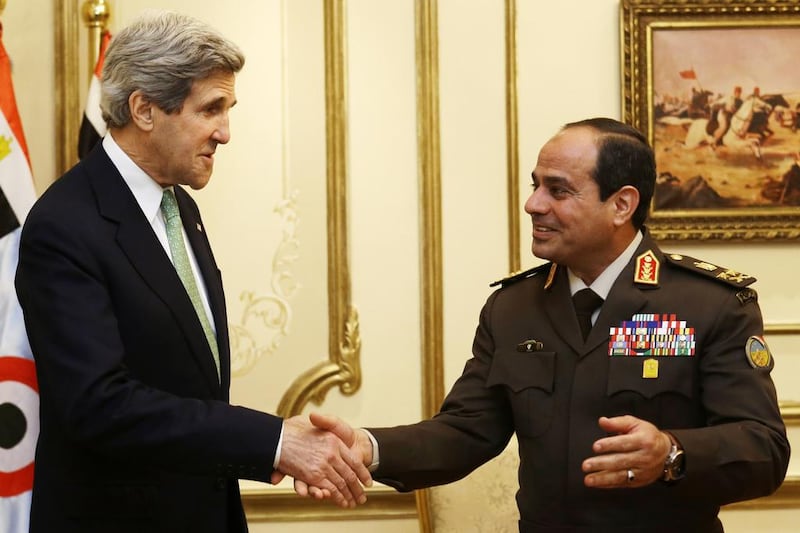New York // During his year at a war college in the United States, Egypt’s military chief, Abdel Fattah El Sisi, was struck by a speech made by a visiting Saudi ambassador about Washington’s relations with its Arab allies.
Then ambassador Prince Turki Al Faisal “tried to remind the officers of the long alliance between the US and Saudi Arabia … and that two countries can share national interests and foreign policy aims but not be in agreement all the time”, said Sherifa Zuhur, a former professor at the war college. “That talk really struck a chord with El Sisi.”
Field Marshal El Sisi, who is likely to run in an upcoming presidential election, may remember those words as strained relations between the US and Egypt begin to normalise, with Congress moving to end a suspension of military aid after lobbying by US administration officials.
Egypt has failed to earn mention in recent speeches by US president Barack Obama, who has said he will prioritise other regional issues.
Some observers have said the omission reflects frustration on the part of Washington, which tried to push Egypt’s military-installed government to integrate Islamists into the political transition after the removal of former president Mohammed Morsi. Even last year’s suspension of much of the $1.5 billion (Dh 5.5 billion) in mainly military aid to Egypt did not appear to affect Cairo’s decision making, giving the impression that the US had lost its leverage.
But the relative silence on Egypt may reflect an acceptance of a political process led by a popular Egyptian military, an institution that successive US administrations have found a reliable ally in maintaining Washington’s core interests in Egypt.
“I would suspect that the civilians at the state department and Pentagon are comfortable with another military president in Egypt,” said professor Jason Brownlee, an expert on US-Egypt policy at the University of Texas. “They want someone who can stabilise the country and their opinion about what will be useful for stability has changed as events on the ground have changed.”
Last summer, after FM El Sisi removed Mr Morsi in the wake of mass protests against the latter’s Muslim Brotherhood-backed government, White House lawyers decided that the administration must suspend portions of military aid until Egypt showed that it was committed to a political transition.
Washington appears to have decided that a constitutional referendum and planned presidential elections meet that standard, as Congress last month voted, as part of the 2014 US budget, to lift the Egypt aid suspension.
Some conditions apply, including the secretary of state, John Kerry, certifying that an elected government “is taking steps to govern democratically” and that it is “sustaining the strategic relationship with the United States” as well as maintaining the peace treaty with Israel.
If these conditions are met, the administration can give $250 million (Dh918m) in economic assistance as well as $975m of the $1.3 billion in military aid after last month’s constitutional referendum and the remaining $576m after presidential and parliamentary elections.
Washington’s military ties to Egypt are over a century old. In 1869, veterans of the US Civil War travelled to Egypt to help train its army. Since signing the 1979 treaty with Israel, a generation of Egyptian officers have trained in the US.
Each year, the Army War College in the small town of Carlisle, Pennsylvania, recruits senior officers from allied militaries to study and build relationships with US counterparts, said Stephen Gerras, a retired army colonel who was FM El Sisi’s faculty adviser when the Egyptian leader studied there between 2005 and 2006.
“The officers who come to the war college are usually going to be in the predominant service of their home country and that relationship is really important over time,” said Mr Gerras, who remembers his former student as reserved and “very religious”, but also smart and warm.
“His loyalty, in conversations to me, was to the Egyptian people and for those of us who knew El Sisi nobody would ever call him a ‘strongman’,” Mr Gerras said. “But at the same time, you could say if he thought the Egyptian people wanted him to do something about the Muslim Brotherhood he would move in that direction.”
In 2006, at the height of the failing US occupation of Iraq, Mr Gerras remembers many conversations with FM El Sisi about what he said were the difficulties of imposing democracy in Arab countries.
“He said: ‘This is going to be a lot harder than you think’,” Mr Gerras said. “And it’s ironic that as the Arab Spring came around we kind of went through the same excitement in America and in the back of my mind I’m remembering these conversations I had with General El Sisi.”
Before his time in the US, FM El Sisi worked in Saudi Arabia as a defence attache. Ms Zuhur, his former war college teacher, said he “has a favourable view of Saudi Arabia and its role in the region and an excellent appreciation of Riyadh as an ally”.
Saudi Arabia and other Arab Gulf countries have pledged so far nearly $20bn in economic aid for Egypt since the July removal of Mr Morsi’s government. Some observers have said the amount, which dwarfs US military aid, will reduce American influence as Cairo turns to more reliable partners.
Though Washington and Riyadh are increasingly at odds over the Syrian war and negotiations with Iran, Mr Brownlee said he views the two sources of aid as complementary.
“Cairo will be aligning with Saudi and US interests and I don’t see [Saudi aid] pulling Egypt away from the US,” he said.
“All the money in the world can’t replace US military hardware, but in terms of who is going to help Egypt’s economy recover in a serious way it’s going to be more Saudi and the Gulf,” Mr Brownlee added. “Economically, it’s appropriate for Egypt to look toward the Gulf instead of across the Atlantic.”
tkhan@thenational.ae





